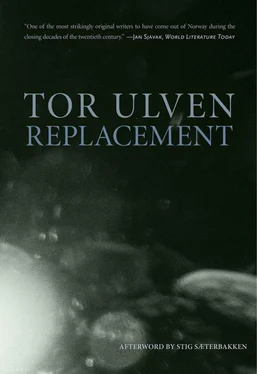You leave the path abruptly and push your way through the tall wet grass, which stubbornly resists (and soaks your already damp shoes, causing the leather to change color, something you know is happening even if it’s too dark to see), before you drop to a half-crouch behind a hedge and pause to observe the building, or rather, to observe the apartment on the bottom floor. Aside from the kitchen window, every other window is dark, but no, upon closer inspection, you realize there’s no light on in the kitchen, because neither the lamp above the table nor the one above the stove is lit, no, instead the gleam is a weak one, spilling, you realize, through the half-open kitchen door, probably coming from the entryway (a slanted inkling of light that’s brightest on the threshold, and that fades to an increasingly indistinct triangle of light further inside the room).
The thick drainpipe is icy cold and rough under your hand. Warily, you glance up, but every single window is dark, all except the living room, which has a sheen of indirect lighting similar to the kitchen (from the same light source?), before setting your foot on the pipe’s mouth and beginning to climb, because even though it’s on the lowest floor, you still have to climb to get there, though while you’re climbing, struggling to wedge the heel of your shoe into the small crack between two bricks while hauling your body up, hand over hand, right left right on up the pipe, like you’re hauling on a rope to hoist something aloft, making progress by fits and starts, it occurs to you that after all she could’ve lived on the fourth floor.
Again, no louder than the first time, even though the muscles in your back and thighs are starting to quiver, and you can’t hold this position much longer, but your cautious knock doesn’t get a reaction this time either, so you squint into the seemingly empty dark, where nothing stands out any more than anything else, before switching on your flashlight, which you don’t keep in your hand like a detective, or on your head like a miner, but around your waist, fastened to a carbine hook, which dangles from a smooth leather strip attached to a bandolier (made of a woven, viscose material like the kind you find in seatbelts), and you see a stack of I-beams, or rather, one end of a stack, and catch a glimpse of the rusty brown, chili-pepperlike dust that coats the whole floor (if you can call this a floor) in a layer that varies in thickness and that forms little hills in the corners, like sand invading a rundown farm house. It’s hard to keep the heavy metal door open while lifting your bike over the high threshold, but you’ve had plenty of practice (after a while it hit you that it’d be far easier to force your bicycle through the stubborn metal door than to patrol the enormous building on foot). The door slams shut behind you, an earsplitting crash like a peal of thunder echoed from every piece of metal stored here, seeming to hang in the air a few long moments afterward, like a clock chime will sing even after the last strike is done.
Every time you lift your right foot, you feel its weight hanging parallel to your thigh in an oblong pouch especially sewn into one leg of your overalls, just a lead kernel encased in a black rubber sheath. Unlike a nightstick, it can’t be used to break heads, nor can it land precise blows, it’d mold itself to the shape of a skull, for example, rather than splitting it open (though the instructions explicitly forbid strikes to the head), and the blow would, therefore, be less destructive, but perhaps more effective. Personally, you’ve never had to use it. The round, cheese-wheel shaped thing knocks against your left thigh, and if you hold it to your ear, you can hear it ticking, time cocooned in a black leather sheath, whose only opening is for the key, although you also know that a narrow strip of white paper (like the kind that streams from a telegraph to an excited click-clacking in old Westerns, at which point a bald man in a green visor examines the message with greater or lesser intensity, depending on how important the incoming Morse is to the film’s plot development), a strip, that is, slowly circulates around the clock, and every time you twist a dial (with its numbers and letters), it puts a stamp on the paper to show where you were at what time; the Edam-shaped thing is, therefore, a kind of foreman, an overseer tagging along on your nightly rounds, a boss dangling from two leather straps. You never see the strip of paper yourself. That right is reserved for the supervisors at watch central.
You’ve got a squeaky voice. The counterweight dangling from the right side of your belt takes the form of a rectangular bag squirming with leather cords, which look like writhing worms and which hold more than forty different keys separated into bundles; each time you come to a new building or industrial complex, you have to fish out a new cord with a new set of keys, keys that unlock alarmed cabinets, garage doors, warehouse doors, office doors, freezer doors, doors leading to production rooms and printers, doors made of iron, wood, safety glass, brass, Plexiglas, doors with handles made of plastic, bakelite, or stainless steel, fire doors with no windows, doors with windows of various shapes and sizes, an infinite procession of gates and doors that aren’t just supposed to be opened, but also carefully shut, and you always jiggle the handle to make sure they’re locked before continuing on your way.
A tentacle of light gingerly feels its way through the dark room, extending and contracting as it tentatively explores its surroundings, or maybe a finger of light executing ornate patterns, signing its name with a flourish as it wanders across the asphalted floor (if what’s asphalted can be called a “floor”), gliding over grimy, silvery gray surfaces belonging to the building’s stash of corrugated steel, finding a pair of discarded work gloves or some lopsided work boots, illuminating girders of reinforced iron that lie arched in perspective like giant strands of clumped spaghetti, falling on rust-flecked, splintered planks browning with age (totally different from the blond, resinous wood found in new buildings). Carefully, your eyes follow the beam thrown from your pocket flashlight (your bicycle light doesn’t work), so you don’t accidentally bump into a stray rafter or a piece of iron jutting out from a pile. The light hits the capper machine, whose red paint is flaking, and which apparently forces, with its thick hydraulic pistons (the only things that sparkle, polished, shining, and new, almost shockingly so, when the light strikes them, against all the worn-out, rusty, dirty, or greasy blackness about), pistons that force two moving edges toward each other with such power that iron girders snap in two like flower stalks.
Something completely different than what one normally associates with the word “office”: polished desks with intercoms, appliances that hum or clack, flickering computer screens, men in suits who cradle receivers while they bark information to a colleague: no, this is more like a cabin or barracks set right in the middle of the huge hall; you grasp the loose door handle, which creaks as you turn it, and recall that the light switch is off to your left. Turning off your flashlight, you flip on the overhead light (though between the first light’s disappearance and the second’s appearance, there’s a moment of total darkness, so short you don’t actually see it, even though it was there): a simple wooden desk, whose scratched and stained surface is covered with papers loosely organized into haphazard piles, some of which (all the same color) are stuck on a spindle; a telephone, a small portable radio, two ball-point pens (blue) marked with the firm’s logo, not to mention tape, scissors, twine, sundry other low-level bureaucratic paraphernalia; a regulation desk chair, whose seat is so worn that both the foam-rubber padding and the plywood base are showing, which is shoved up against the desk; and, hanging on the walls, shipping lists organized by code, price tables, pictures of sports cars and half naked women, a medicine cabinet marked with a faded green cross. Besides a spindly metal stool, the rest of the meager furnishings consist only of a radiator, a gray metal locker, and a porcelain sink with a mirror. The latter is probably the reason there’s another station key back here (danger of leaks), located next to the valve and fastened by a chain to the water pipe; as instructed, you insert this key into the mechanism, your portable overseer, and turn it clockwise, making a creakcreak sound, just like an antique mantle clock makes when it’s wound. When you stand up and release the station key so that it clinks against the water pipe, you can’t resist looking into the dirty, faded mirror. Man, you wish you had wrinkles. You want to be old as soon as possible.
Читать дальше












